‘Live At Blues Alley still sounds pretty cool!’ Keith Grimes, Eva Cassidy Band guitarist
Eva Cassidy Band guitarist Keith Grimes: ‘I’ve been asked by my friend Johan to provide a few remembrances from my time with the Eva Cassidy Band. And what better time than now? For it was on this very evening, 22 years ago, that we hit the stage at Blues Alley to begin recording our live album (2 and 3 January 1996). I was younger and hairier then, but the memory remains with me still. Let’s begin at what, for me, was the beginning, around 1990.
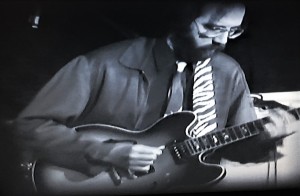
Keith Grimes
Mike Dove, the man who has worked on my guitars for many years, and has met my insufferable demands in an uncomplaining fashion, lived next door to Chris Biondo. Chris had a recording studio, Black Pond, at the time, and he had been working with Eva, basically free of charge, which ideally suited her budget! He was quick to recognize the extraordinary depth of Eva’s gift and he wanted to do all he could to support her artistic endeavors. They’d been making recordings together for a while at that time, and decided to put a band together to play local gigs. Mike mentioned to Chris that I was at liberty, and I got a phone call suggesting I come over and listen to the tapes they’d recorded. (Yes, kids, it was still tape back then.) I agreed to do so, not without misgivings. Chris sounded so cocksure that I was pretty sure Eva would turn out to be terrible. But Chris got the last laugh on that one. He played the tapes, I was converted, and a rehearsal was hastily convened. And what a rehearsal it was!
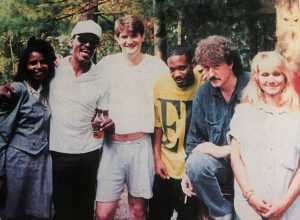
Jocelyn Brown, Chuck Brown, Lenny Williams, Ju-Ju House, Chris Biondo, Eva
Eva Cassidy (vocals, guitar,) Ju-Ju House (drums) and Kent Wood (keyboards) were three people I’d never met before, each of whom brought a distinct flavor. Eva was very serious, spoke but little, and sang like an angel. Since we were rehearsing in the recording studio, I was actually looking at her through a glass partition as we played, so, a bit of an unusual meeting. Ju-Ju and Kent were merry men, constantly hurling verbal abuse at Chris, who was playing bass behind the control board and answering them in kind. They had obviously been working together for quite some time. We quickly put together enough songs to play live, and did a gig, I think, the next day!
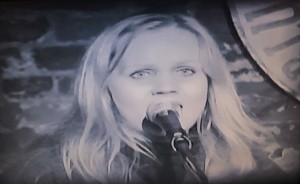
Eva in Blues Alley
Well, as it turned out, Ju-Ju and Kent had a lot of irons in the fire, employment-wise, and didn’t stay with us long, although they continued to record with us quite a bit. Jimmy Campbell joined us on drums for live performances. I think Eva wanted keyboards and was thinking of not even playing guitar in the band. Chris and I had to gang up on her and convince her that her guitar contributions were important to our sound. I felt vindicated when, months later, she admitted we were right. Strange as it may seem to the rest of us, Eva had difficulty realizing how good she was.
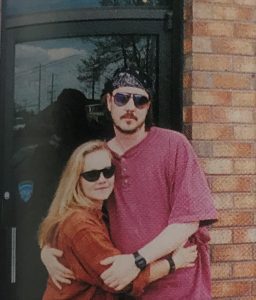
Eva & Chris
And so we sallied forth boldly, two guitars, bass and drums. Just like the Beatles! Jimmy left us to concentrate on other projects, and was replaced by the intriguingly named Raice McCleod. Lenny Williams, who had played with Eva since before I entered the picture, was only occasionally available to us. Gigs were sporadic and money was scarce. And, unbelievably to me, public acceptance was not immediate. We played a lot of taverns where people wanted to drink and yell at each other. Nuance and subtlety were not prized in this atmosphere, and the value of what was being offered was lost on those wishing that we would play something by the Rolling Stones. So, we bumped along as best we could. Enter Chuck Brown…
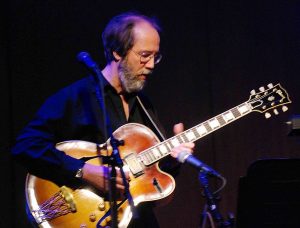
Keith Grimes
Chuck Brown and the Soul Searchers had an international reputation of sorts, but were nowhere bigger than in Washington D.C., where Chuck was ‘The Godfather of Go-Go,’ a unique product of the Washington area. He’d recorded with Chris and he had become aware of Eva’s talents. He’d been wanting to do a record that was a departure from his bread-and-butter Go-Go sound, and figured Eva to be the ideal duet partner. Smart move, Chuck! And so we made a record with Chuck and Eva called The Other Side.
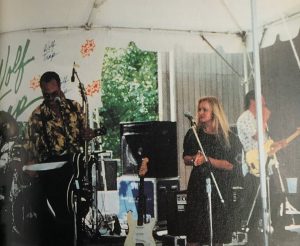
Chuck and Eva Live
This did a lot to boost Eva’s recognition factor, and led to the Eva Cassidy Band getting a couple of dates at Blues Alley, one of the area’s more prestigious venues. Fortunately, we had Lenny on piano at these, which enabled us to do some material we hadn’t been able to do with the all-guitar army. Despite some challenging circumstances, we got a good record out of it, and things were looking up. But a few months later Eva was gone. Chuck’s gone now, too. But you know, we got what we got and Live At Blues Alley still sounds pretty good, doesn’t it?’
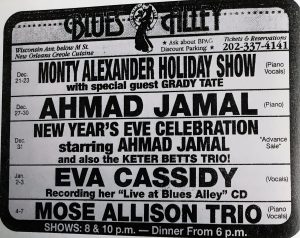
Blues Alley Poster
One response to “‘Live At Blues Alley still sounds pretty cool!’ Keith Grimes, Eva Cassidy Band guitarist”
Leave a Reply
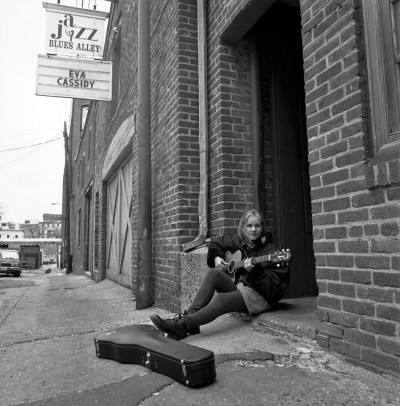



Spot on! Eva’s voice is so silky smooth and soothing. I just close my eyes and seem to float listening to Songbird.